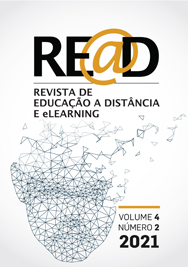A autoavaliação e a avaliação entre pares: Estudo piloto numa Unidade Curricular do 2º Ciclo do ensino superior em Portugal
DOI :
https://doi.org/10.34627/vol4iss2pp97-115Mots-clés :
Avaliação alternativa digital, Autorregulação da aprendizagem, Corregulação da aprendizagem, Avaliação entre pares, AutoavaliaçãoRésumé
Muito se tem evoluído no plano teórico e também metodológico, acerca dos processos de ensino e aprendizagem. A despeito disso, o erro continua a ser visto de forma negativa, muito interligado ao paradigma de avaliação sumativa. No entanto, na perspetiva de uma avaliação formativa e formadora, centrada em processos cognitivos que favoreçam o aprender, o erro, a cooperação e a autorregulação da aprendizagem são aspetos fundamentais do sucesso do aprendente. Estes aspetos são ainda mais essenciais quando mobilizamos o uso das tecnologias digitais nesta mediação do processo de ensino e aprendizagem. Com base nesta última perspetiva, este artigo traz o relato da experiência de implementação de um processo de autoavaliação e avaliação entre pares com uso de ferramentas digitais, no âmbito de uma unidade curricular de um curso de mestrado, na modalidade online, em uma instituição de educação superior em Portugal. Como referencial teórico para esta experiência adotou-se essencialmente o quadro conceptual do Modelo PrACT (Praticabilidade, Autenticidade, Consistência e Transparência), assente numa cultura de avaliação que se contrapõe à cultura do teste, ajustada às necessidades de currículos comprometidos com o desenvolvimento de competências. Os resultados obtidos nesta experiência possibilitaram perceber os desafios implicados no processo de se autoavaliar e de avaliar os pares, tanto do ponto de vista dos estudantes, quanto do ponto de vista do docente, que necessita adaptar-se a um cenário no qual deixa de ser o único responsável pela avaliação e regulação da aprendizagem dividindo essa responsabilidade com os outros atores envolvidos.
Téléchargements
Publiée
Numéro
Rubrique
Licence
(c) Tous droits réservés Elizabeth Batista de Souza, Lucia Amante 2021

Ce travail est disponible sous licence Creative Commons Attribution - Pas d’Utilisation Commerciale 4.0 International.
Os autores conservam os direitos de autor pelo seu trabalho e concedem à revista o direito de primeira publicação, com o trabalho simultaneamente licenciado sob uma Licença Creative Commons - Atribuição-NãoComercial 4.0 Internacional.



